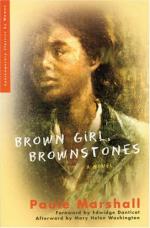|
This section contains 171 words (approx. 1 page at 300 words per page) |

|
The development of identity is at the core of Brown Girl, Brownstones, and in its related books The Chosen Place, The Timeless People (1969) and Praisesong for the Widow (1983). Through the eyes of Selina Boyce, the reader sees the struggles of her mother Silla and the women of her Barbadian Brooklyn neighborhood, which is the major setting of the novel. Deighton Boyce, Selina's father, represents a back-homein-Barbados mentality, a kind of fantasy of spirit, gentleness, love, passion, and warmth. Silla comes to reflect a cold, unfeeling, competitive materialism, which is the face that America presents to the "Bajan" immigrant. Silla and Deighton's relationship embodies the extremes of the Barbadian immigrant experience in America. The old culture — and the old gender definitions — must be refashioned to suit a new life. Silla and her friends must find ways of coping with being disparaged as black, female, and foreign.
Selina...
|
This section contains 171 words (approx. 1 page at 300 words per page) |

|



